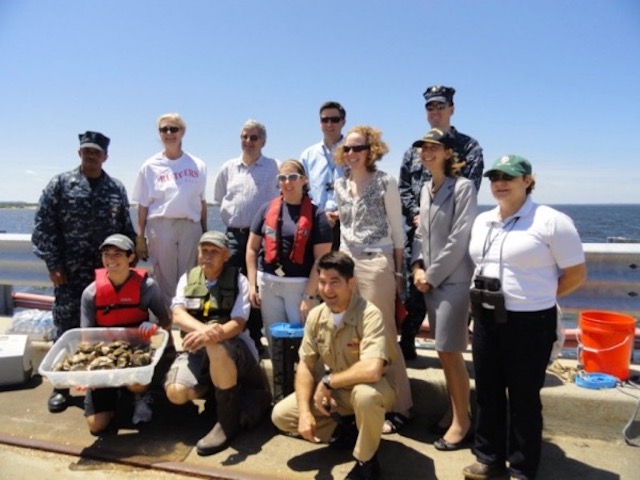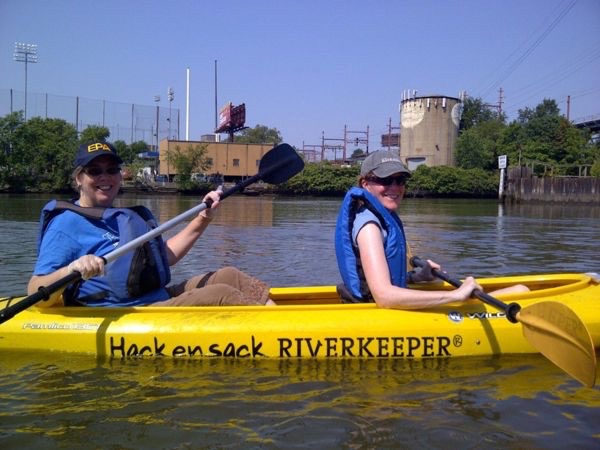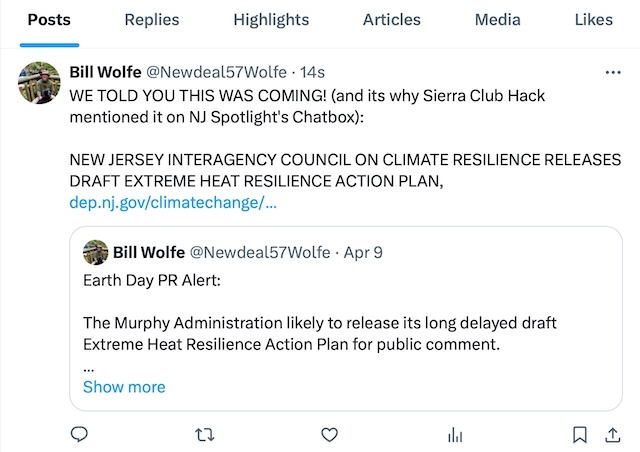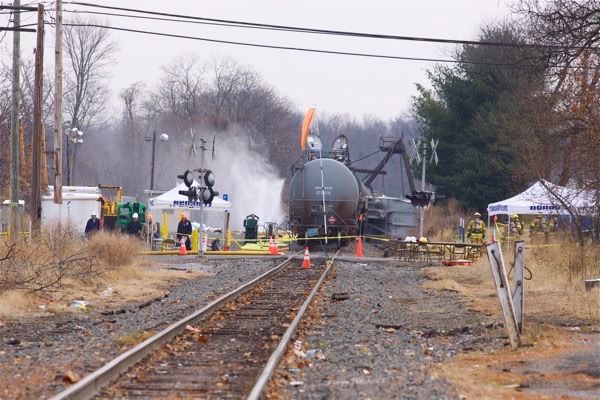Murphy DEP McCabe Pledges To Re-Propose Christie Highlands Rollback Septic Rule
McCabe says she’s “unfamiliar” with DEP C1 Exceptional Waters Stream Buffer Program
Agrees that 1,300 new housing units in the Highlands is “minuscule”
A Question of Balance?
Call me (call me) on the line
Call me, call me any, anytime. ~~~ BlondieLike Obama’s “all of the above” energy policy … Murphy will say he’s pursuing a “balanced approach”. ~~~ Bill Wolfe (1/31/18)
Balance is my mantra. ~~~ Murphy DEP Commissioner Catherine McCabe, confirmation hearing (5/14/18)
[Update: 5/23/18 – the press finally got it right – the narrative is framed:
Acting DEP Commissioner Catherine McCabe faced her confirmation hearing last Monday. Overall, we viewed it as a huge disappointment and outlined some of our concerns.
We are not alone. The Record also ran a story highly critical of McCabe’s response to the Dupont Pompton Lakes site, see: Phil Murphy says DuPont pollution in Pompton Lakes still under review
[Update: the cave on Murphy’s commitment to end the bear hunt is another example, see: Acting DEP chief: Bear hunt is on for this fall. And so is this: Just $50M From NJ’s Exxon Settlement Will Go to the Dept. of Environmental Protection, which generated a “Thumbs down” by Record editorial~~~ end update]
In what I plan to write more about, today’s post drills down on 2 important issues McCabe faced questions on and spoke to: 1) how her DEP would address the Christie DEP Highlands rule and 2) the Category One (C1) exceptional waters stream buffer program.
I found it stunning that McCabe challenged Environment Committee Chairman Bob Smith (D) on his criticism of the Christie DEP Highlands septic density rule – essentially defending the Christie DEP – while making concessions to fact free attacks by conservative Republican Senator Cardinale (R), who claimed that a specific DEP staffer classified a “mud puddle” as a navigable water. He said this same DEP staffer found wood turtle on a development site, ultimately forcing the proposed development to relocate to NY State.
But why was McCabe unfamiliar with and not willing to defend DEP’s C1 buffer program, while at the same time familiar with and challenging critics of Christie’s Highland septic density rollback?
I) “Mud puddle” – “Wood turtle”: McCabe undermines her own staff – invites improper political intervention in DEP regulatory decisions
Senator Cardinale’s claims were egregious fact free ideological attacks that demanded pushback – but McCabe rolled over.
And in the course of rolling over, she echoed Christie DEP policy and practice about expediting permits and streamlining reviews through the Office of Permit Coordination (an Office established by the Whitman “Open For Business” Administration).
Still, Cardinale pressed on. After presenting his “mud puddle as a navigable waterway” case he asked:
If you have employees in your department making those types of decisions, and it came to your attention, what would you do?
McCabe did not defend the DEP, the wetlands rules, the integrity of the regulatory process, or her own staff. Instead, she replied:
I would go out and look at the site and talk to not only our staff members but talk to the people who are seeking the permit to find out what the situation really is.
Get that?
The developer’s perspective is “what the situation really is”.
McCabe also said she would conduct a site visit. That is a completely inappropriate role for the Commissioner, as we’ve written about McCabe’s wetlands enforcement tour with Senator Sweeney. Additionally, the DEP land use programs issues thousands of permits every year – she could not possibly conduct site visits at the hundreds of sites that generate disputes between developers and DEP staff.
Still not satisfied, Cardinale continued his assault.
He then outlined a case, with the same company, 5 years later, where the same DEP staffer documented wood turtle on site and as a result the company left NJ for NY. Cardinale droned on and asked:
Do you believe there shouldn’t be some way in the Department to circumvent the lengthy periods of time it takes to resolve issues such as that so that we do not have an un-neccessary movement of people out of the state. And this is not just residents, but the jobs, into NY state.
Instead of engaging that debate and defending her staff, McCabe again folded. Here’s what she said:
If you hear of a situation like that developing again, where there is a question of a business is leaving NJ, because it is having a problem with out permitting process, I encourage you to bring it to my attention so I can make sure it is resolved as quickly as possible.
Is McCabe a Blondie fan? (call me!)
So McCabe is no only going to conduct field visits, she is going to be answering the phone and conducting hundreds of quasi-judicial informal hearings on contested permits, based on political intervention and what is legally called “ex parte communications”. (see the Blondie song above)
I wrote about why that was a totally inappropriate approach, in response to McCabe’s wetlands enforcement tour with Senate President Sweeney.
Cardinale, his pound of flesh in hand, finally relented: “I thank you very much for that”.
McCabe was just awful, showing no spine whatsoever. Cardinale is a notorious hack. McCabe should pushed back, not groveled. I have locked horns with him, after he called Bergen County C1 streams “drainage ditches”, see:
- Senator Cardinale Walks Back “Drainage Ditch” Remark
- Senator Cardinale Calls NJ Streams “Drainage Ditches”
II) McCabe Says She Is Unfamiliar with DEP’s Category One Exceptional Quality Waters Program(C1)
Cardinale then moved from mud puddles and wood turtles, to an attack on the DEP’s Category One (C1) stream buffer program.
After he summarized his understanding of the C1 buffer program, he complained that he saw numerous development projects that were building within 300 feet of a stream. So Cardinale asked:
Can you clarify for me what this 300 hundred feet really means?
McCabe responded:
I am not yet familiar with NJ’s stream buffer rule... I don’t know what particular circumstances it would apply to and what could explain the buildings that you’re seeing, but if there is a particular situation you would like me to look into, I would put that on the top of my pile and learn it quickly.
More groveling.
The C1 buffer program was a cornerstone of Democratic Governor McGreevey’s environmental legacy, second only to the Highlands Act, which was based on the same legal anti-degradation policy under the Clean Water Act.
It is one of DEP’s most powerful regulatory tools to protect water quality and restrict development, It is one of the strongest stream buffer programs in the Country.
It was a target of the Christie DEP for rollback and the subject of extreme controversy, including a legislative veto of Christie DEP rules that weakened the C1 program (a final veto was derailed by a Sweeney deal. Could dodging Sweeney be why McCabe claims she is unfamiliar?)
For an Acting DEP Commissioner, more than 4 months into her tenure, to still be “unfamiliar” with this program is outrageous and totally unacceptable.
Actually, I simply don’t believe McCabe is not familiar with the C1 program. The C1 program was mentioned in Transition, it is critical to controversial pipeline decisions, and I sent her information on the C1 buffer program months ago. Maybe that’s why she’s since blocked my email.
It does not pass the straight face test that McCabe is unfamiliar with all this. If she really is, she is grossly incompetent and should not be confirmed by the Senate.
McCabe not only failed to defend the DEP C1 program and push back against criticism from a conservative Republican’s attacks, she then defended the Christie DEP’s Highlands septic density rule and pushed back against Chairman Smith.
III) Highlands
Senator Smith, Chairman of the Environment Committee, led the charge to oppose the Christie DEP rollback of the Highlands Septic Density Standard, which resulted in a rare legislative veto of that rollback as “inconsistent with legislative intent” to prevent the degradation of high quality Highlands waters.
Smith asked McCabe about the status of the Christie Septic Density rule.
Remarkably, McCabe defended the Christie DEP rule, challenged Smith’s premises, downplayed the impact of the rollback, and pledged to re-propose another septic density rule!
Senator Smith:
In the old administration, there was an effort to change the Highlands septic density rules. The legislature .. invalidated those rules. ..Is there any plan to do anything?
McCabe replied:
I don’t think we need to do anything…. We’re back at the drawing board. I’ve taken a look at the science myself.
Frankly, I think what happened was failure to communicate between our scientists and the legislature.
Whaaaaaat? Failure to communicate? Are you kidding me? It was a fucking rollback, you idiot. Was she watching the movie classic “Cool Hand Luke” the night before? Failure to communicate indeed!
McCabe went even further:
I have asked to have the model re-reun so that we can use only data that pre-dates the time [passage] of the Act. What happened apparently was that they changed the result where the standard would be based on adding in a lot of new data. Now that’s good science…
No, it is NOT good science. It’s statistical manipulation. It was BAD science because the data did not represent actual background groundwater water quality.
McCabe continued:
I think that what we’ll do going forward and get the results from the rerun is that we’ll show you how that works out and we’re happy to work with the legislature on a path forward. But I have learned from our scientists is that people had a a misimpression of just how much of a difference that change made. It did not change all that much on the ground.
Smith interjected:
Minuscule
McCabe agreed
Yeah.
Smith
1,300 more homes
Do you think 1,300 more homes disturbing an unknown acreage of land in the Highlands Preservation Area is “minuscule”?
Shame on McCabe.
There was nothing wrong with the existing rule, legally or scientifically or as a matter of public policy. The Christie DEP decided to roll it back based on settlement of a lawsuit filed by the Farm Bureau.
McCabe is taking the same legal and scientific position as the Christie DEP in regard to the Farm Bureau lawsuit.
Instead, she needs to work with the AG and petition the Court revoke the Christie DEP settlement agreement with the Farm Bureau and defend the existing rule. There is no need to re-propose any new rule.
Beware folks – a wolf in sheep’s clothing is among us.
(next – Senator Sarlo seeks “balance” and Sen. Dougherty exposes risks of unregulated prescription drugs in water supply.)



